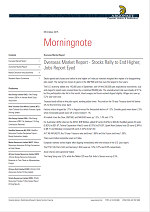Market Update & Important Indicators
U.S. stocks rose to start the week, led by energy shares that climbed with the price of oil. Energy companies in the S&P 500 gained 1.7%, and U.S. crude oil climbed as production outages continued. Investors' concerns about the pace of world-wide economic growth helped drag stocks sharply lower at the start of 2016. Major indexes have since climbed into positive territory for the year, though the rally has slowed and the Dow industrials and S&P 500 have fallen for three consecutive weeks. Williams Companies rose 5.5%. Marathon Oil gained 5.4%, and FMC Technologies climbed 4.8%. Technology firms in the S&P 500 rose 1.2%, lifted by a 3.5% gain from Apple after Warren Buffett's Berkshire Hathaway took a new $1 billion stake in the technology giant in the first quarter. Apple shares had fallen about 13% through last week since the company in April reported its first quarterly revenue decline in 13 years. A slump in consumer-focused companies helped major indexes close lower Friday, outweighing a strong report on retail sales. Some investors said that after a big rally from February's lows, better earnings were the key to further gains.
The Stoxx Europe 600 rose less than 0.1%. Holidays across the region were expected to keep trading volumes light while global stocks struggled for momentum as disappointing Chinese data fueled concerns about the world's second-largest economy.
U.S. government bonds pulled back as investors took some chips off the table following the market's biggest weekly price gain in more than a month. Higher crude oil and stock prices also sapped demand for haven bonds. The 10-year yield has dropped more than half of a percentage point this year, highlighting strong demand for U.S. government debt amid sluggish global economic growth, still contained inflation threats and a very patient approach by the Federal Reserve to raise interest rates.
Stocks in Asia finished mostly up Monday, with consumer and technology shares surging in Hong Kong despite an abrupt plunge in the afternoon. The Hang Seng Index closed up 0.8% at 19883.95, recovering from what some traders called a "fat finger" incident just after 2 p.m. local time. The benchmark tumbled more than 150 points at one point during the session. Trading volumes were thin and the chatter was that a trade in Hong Kong stock futures pushed down the market, traders said. "When you have thin volumes in the futures market, it's easy to push things down," said Andrew Sullivan, managing director at brokerage Haitong International. In response to queries about the abrupt afternoon plunge, a spokesman for Hong Kong Exchanges and Clearing Ltd., the city's stock market operator, said that it hasn't received any claims related to trading errors. The Hang Seng Index was up as much as 1.3% in the morning, before the incident. Elsewhere, Japan's Nikkei Stock Average closed up 0.3% and the Shanghai Composite Index was up 0.8%. South Korea's Kospi finished roughly flat. Gains came despite disappointing Chinese economic data, which began last Friday and came through the weekend. Chinese banks lent a less-than-expected 555.6 billion yuan in April, down from 1.37 trillion yuan in March. Figures on Chinese industrial output, fixed-asset investment and retail sales also missed expectations..
Australia's stock market posted a modest rise Monday, supported by banks and a jump in healthcare stocks. Despite starting the session in the red after a raft of disappointing Chinese economic data and a weak finish for U.S. shares Friday, the S&P/ASX 200 pushed higher to end up 29.9 points, or 0.6%, at 5358.9. The healthcare subindex notched the strongest gains, rising 2% to an all-time high after the federal government over the weekend promised to introduce legislation to control rents for pathology centers. The government also said it would leave bulk-billing practices unchanged if it is returned to power in the coming national election. Sonic Healthcare and Primary Health Care climbed 4.9% and 5.2%, respectively. A recovery by the major banks after declines at the end of last week helped underpin broad gains, although energy shares declined after U.S. crude-oil future ended Friday down 1% and the Brent benchmark slipped 0.5%. Commonwealth Bank of Australia, Westpac and Australia & New Zealand Banking each gained 0.8%, while National Australia Bank rose 0.3%. In the energy sector, Woodside Petroleum and Santos each fell 0.7%, while smaller Beach Energy was 1.5% lower.
Copper prices closed higher in London, supported by dollar softness and higher oil prices. The London Metal Exchange's three-month copper contract was up 0.8% at $4,650 a ton at the PM kerb close, having hit a two-day high earlier in the session at $4,687 a ton. Among the other base metals, aluminum closed up 0.8% at $1,548 a ton, zinc was up 0.6% at $1,900 a ton, nickel was up 0.8% at $8,720 a ton, lead was up 1.6% at $1,738 a ton and tin was up 1.4% at $1.38%.
Recent Contacts & Presentations
Red 5 (RED), Medusa Mining (MML), Saracen Mineral Holdings (SAR), Paradigm BioPharmaceuticals (PAR), Pilbara Minerals (PLS), Energia Minerals (EMX), Deep Yellow (DYL), Paladin Energy (PDN),), West Africa Resources (WAF), Finders (FND), Credo Resources (CRQ) , Orthocell (OCC), Capricorn Metals (CMM), Gold Road Resources (GOR), Otto Energy (OEL), Dakota Minerals (DKO), Cradle Resources (CXX), Kidman Resources (KDR)


